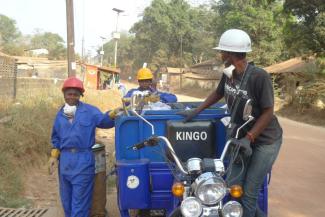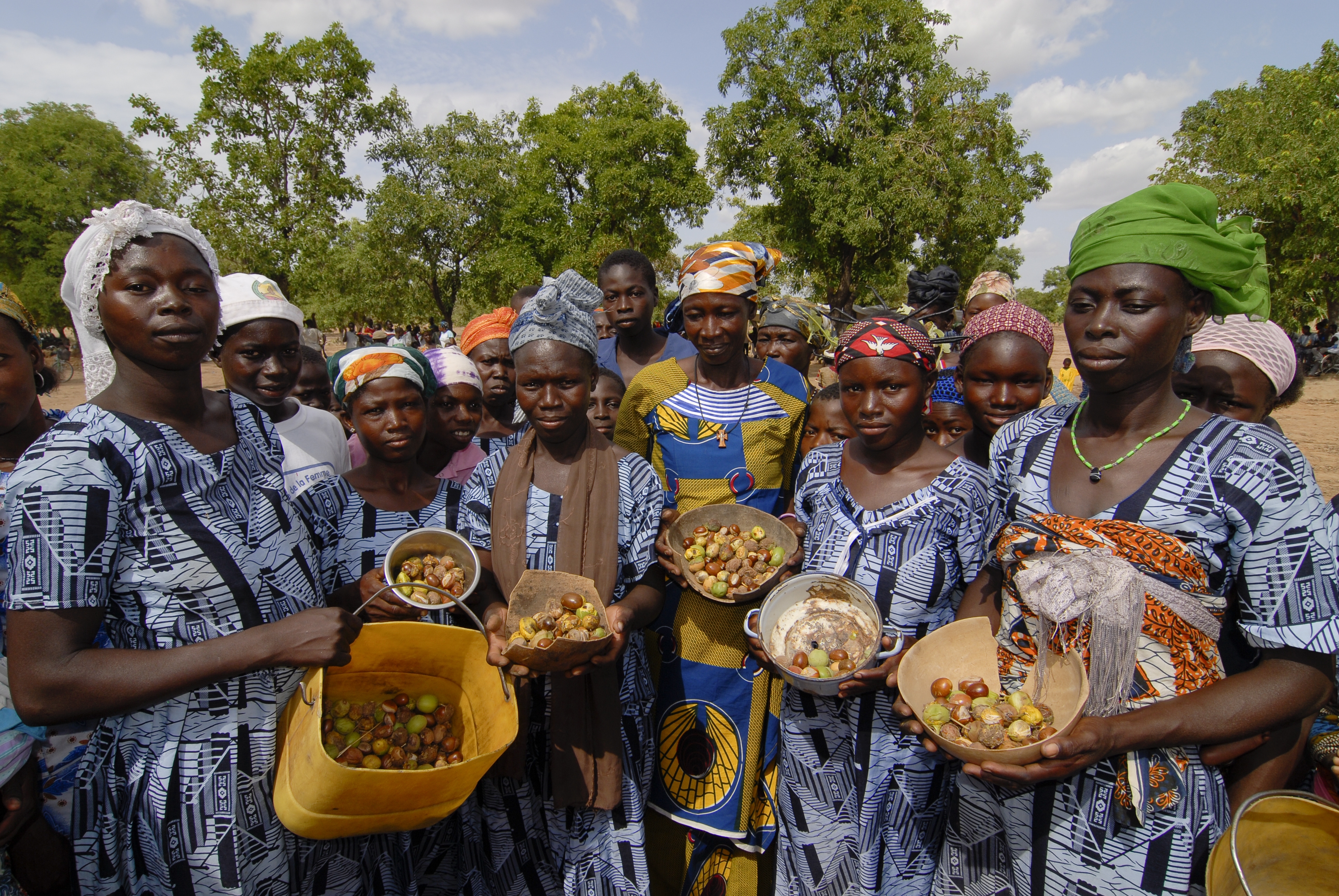Urban rubbish
The cleanest city in Sierra Leone

In Sierra Leone’s rapidly-growing mid-sized cities, each resident generates about 450 grammes of waste per day and 250 grammes of human faeces. The lack of sewers and waste transport systems results in unregulated disposal, which in turn increases the risk of infections from preventable diseases.
Since 2013, Welthungerhilfe has been helping Bo’s city council to improve waste management. The German-based non-governmental organisation trains independent waste collectors, latrine emptiers, recyclers and traders and links them to government authorities. A new municipal waste management authority has been established, and transport and disposal capacities have improved.
In cooperation with traditional leaders and representatives of civil society, local ordinances have been passed. Rules of conduct have been made binding. An integrated waste-management system is emerging, and it has been quite successful so far. Bo is now considered the country’s cleanest city, and other mid-sized cities are starting to follow its example.
Informal dump sites
In 2013, the city of Bo, which is home to 200,000 people, generated almost 25,000 tonnes of household waste and 8,000 tonnes of commercial waste. That is not much compared with other countries, but the public waste management system was overwhelmed nevertheless. At the time, the city’s waste collectors could only provide basic services to 30 % of households at most. Even though residents were willing to pay for waste disposal, there were at least 127 informal dumping sites in Bo in 2014. Rubbish also ended up in courtyards, in vacant lots, in storm drains along the main streets, or it was burned.
Especially in view of fast population growth, poor sanitary conditions present a serious health risk to the city’s residents. More than 18,000 tonnes of human faeces were generated in Bo in 2014. The city has no sewer system. Sixty-seven percent of residents rely on latrines, 48 % share toilets with other households and 18 % of the households surveyed reported overflowing pit toilets. Open defecation is widespread, as are so-called “flying toilets”: people relieve themselves in plastic bags and throw them on unregulated dumps or in the storm drains.
Integrated waste management
An integrated waste-management system consists of waste prevention, efficient waste removal, better rates of recycling and proper disposal of rubbish and faecal sludge in a sanitary and environmentally-friendly way. The precondition for such a system is a functioning administrative structure. Until 2014, waste transport was the only public service offered in Bo. Since 2015, an independently-operating waste management authority has assumed responsibility for all aspects of integrated waste management, including waste collection in cooperation with youth groups, waste transport, which continues to be offered as a public service, systematic support for small businesses in the recycling sector and the construction of a controlled dispoal site, which should be operational by the end of 2016.
Parts of the waste industry were outsourced to the local private sector. For instance, waste collection has been taken on by the youth network Klin Bo Services, and recycling is being handled by waste-to-wealth entrepreneurs. Thanks to support to small and micro-enterprises, a formal market for waste has emerged which involves collectors, traders and recyclers of reusable material. Local laws were passed in cooperation with civil society and traditional leaders, so unregulated dumping is now prohibited throughout the entire city.
In order to award private contractors licensed monopolies for waste collection in specific neighbourhoods and to provide effective support to recyclers, the municipal government first had to define the goals clearly and identify performance indicators. Public monitoring has served the system’s efficiency by reducing corruption and allowing innovative and cost-effective solutions to take hold.
The city council’s approach is innovative in Sierra Leone. The “Bo model” has been discussed by various national bodies as well as at the ministerial level. The sense of local ownership has benefited from this positive public image as well as from receiving the “Best City Council Award” in 2015.
Waste collection door-to-door
The city council originally maintained 12 collection sites where residents could drop off their household waste free of charge. The city would then take care of the costly transport to the dump site. However, less than a third of the people used this system. Moreover, waste removal was not reliable, so rubbish containers would frequently overflow. People who lived near the collection sites would often set fire to the containers to stop them from attracting flies and to get relief from the smell.
A survey conducted by Welthungerhilfe showed that a large share of the residents were prepared to pay for waste collection services if rubbish was picked up reliably door-to-door.
In 2013, the city council introduced a waste removal system, supplementing the collection sites. The city was divided into 10 zones, and youth groups were given a monopoly to collect waste there. The groups also assumed responsibility for building a customer base. The waste removers have organised themselves in a network called Klin Bo Services in order to be able to represent their interests in interaction with the city council. The number of waste collection sites was reduced to seven as it proved easier to serve customers this way.
Operating costs were lowered by organising the groups into four units. This step was made in 2015 with support from the waste-management authority. It soon became clear that the motorised three-wheeled scooters which were being used were not the best vehicles for the job. Their capacity is a mere 350 kilogrammes. The constant back-and-forth between residents’ homes and the containers overburdened the youth groups. The purchase of small trucks with a transport capacity of two tonnes provided relief. They can now take waste directly to the dump site, rather than relying on urban collection sites. The city council is subsidising this more costly means of transport.
By enlisting youth groups to remove waste, the city of Bo managed to raise the share of households that benefit from collection services to more than 41 % in 2015. The entire system has become significantly more reliable, as customer surveys prove.
Using pumps to empty latrines
Many of Bo’s streets are narrow and latrines tend to be poorly build and inaccessible. Therefore, it is often impossible to empty them mechanically and use tank trucks. Emptiers who do the job manually are called “night soil men”. The tradition is that they climb into the narrow cesspools without protection and expose themselves to injury from broken glass, needles and other dangerous objects. They then empty the faeces into shallow pits in clients’ gardens or courtyards. This practice poses serious health risks to all people involved.
The introduction of hand pumps has revolutionised the work of the latrine emptiers. The pumps are easy to use and can be assembled on site. They serve to pump the faecal sludge out of the pits into a tank that is attached to a simple vehicle – for instance a motorised three-wheeler. Faecal sludge can thus be taken away from the city for proper treatment and disposal without any ground-water contamination. It is no longer necessary to dig local pits, which is time-consuming and costly.
Generally speaking, Bo’s waste-management system has improved considerably. In the second half of 2015, the waste-management authority’s staff and private waste removers brought a total amount of 280 tonnes of rubbish to the dump site on average per week. That figure was about 45 % of the city’s waste. The collection rate has thus doubled in three years.
The dump site that is currently in use is located outside the city limits. It is currently being transformed into a licensed dump that will conform to the minimum standards. In addition to the dump, a composting plant is in the works.
Jochen Moninger was Welthungerhilfe’s country director for Sierra Leone until December 2015. He now is the innovation manager at the NGO’s head office in Bonn.
jochen.moninger@welthungerhilfe.de
Raphael Thurn-Valsassina is Welthungerhilfe’s project manager in Bo.
raphael.thurn@welthungerhilfe.de











